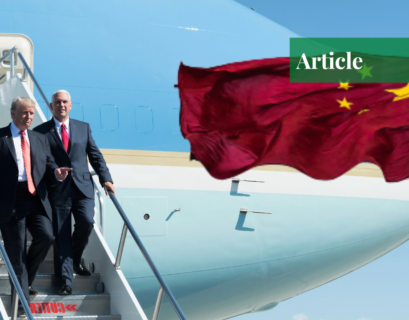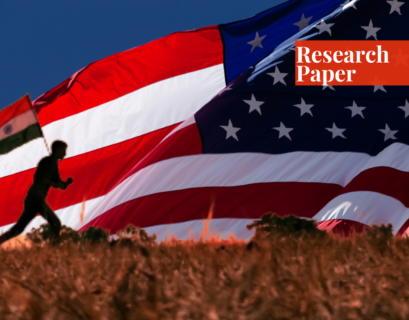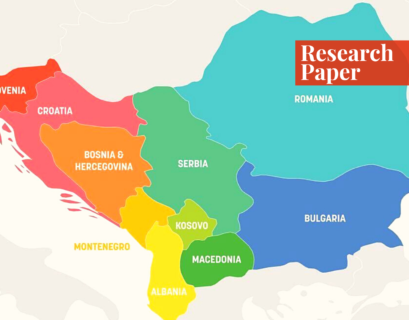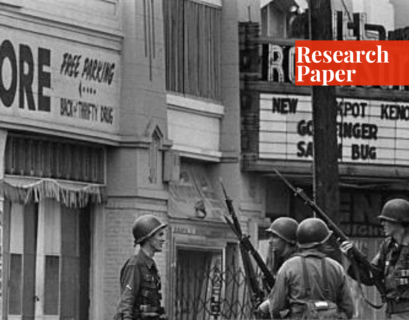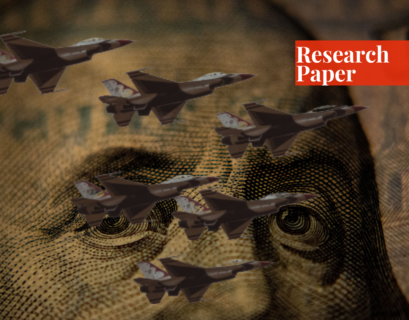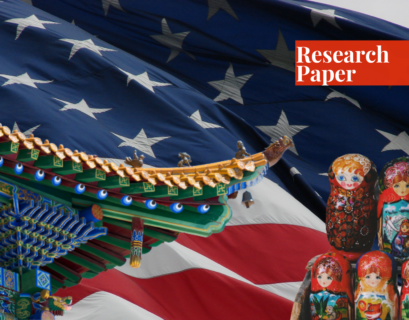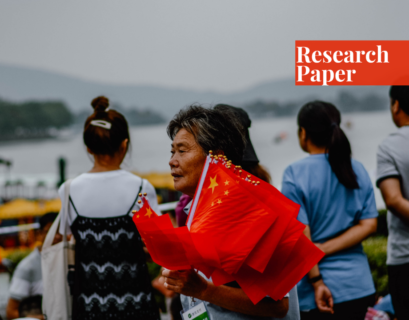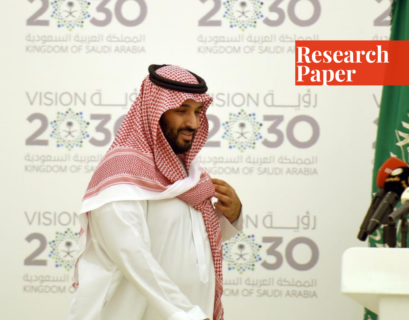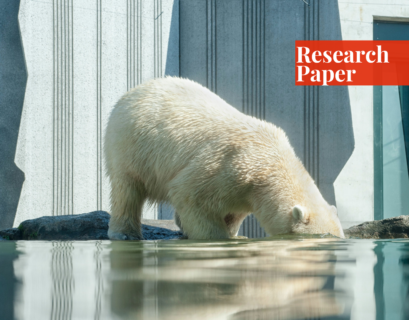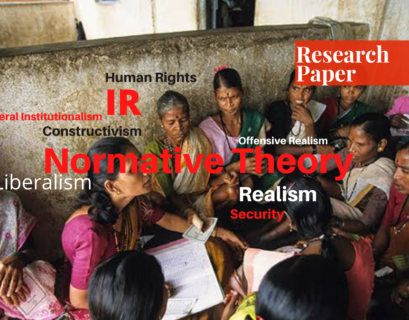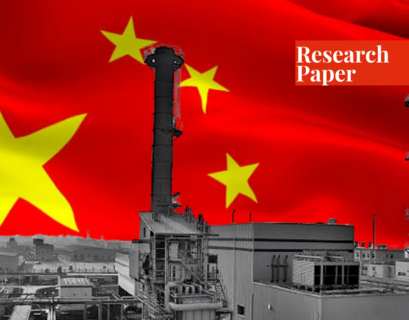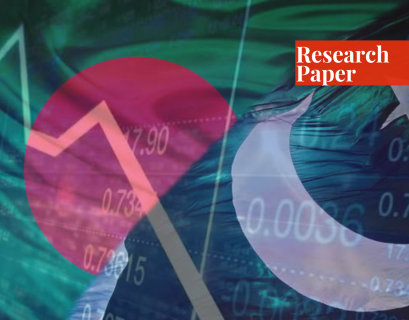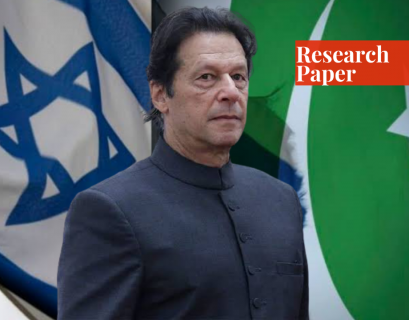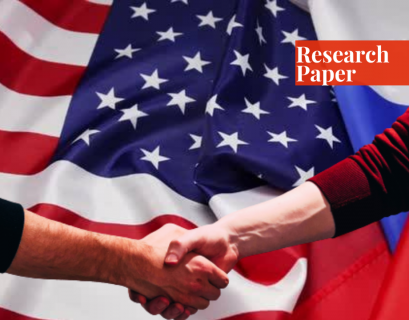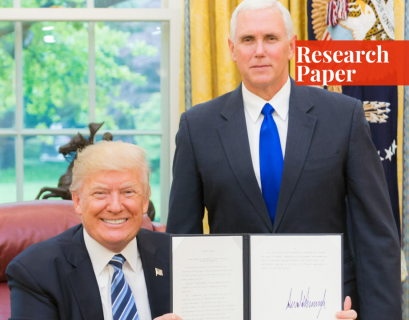Sino-US Trade War During Trump’s Presidency
This article is aimed at explaining the fractured relationship between China and the United States during Trump’s term in office. The author explores different conflicts of this era which include the trade war and the 5G race, among others.
The future of Sino-US relations depends on how respective administrations will steer the conflict.
Thriving US and Indian Relations: Implications for Pakistan & China
Since the Cold War, the US and India have signed a series of strategic agreements, strengthening their alliance. The US-India nexus stems from the threat of a rising China in the international arena. The author, Muhammad Abubaker, notes that the US has capitalized on the Indian regional aspirations and effectively used India to advance America’s strategic goals in Asia vis-à-vis China. He explains that this strategic cooperation between the two powers has impacted China, Pakistan, and the Asian region as a whole. It has aggravated Pakistan’s security dilemma and forced it out of the American bloc. The insecurity caused by this has compelled Pakistan to strengthen its relations with China and look for an ally in Russia.
Blue-Collar Employability: Building a Strong Foundation with Technical and Vocational Education
Technical and Vocational Education and Training (TVET) is recognized as an important aspect of increasing the employability of workers. However, the author notes that the current model of TVET employed in Pakistan places more emphasis on domain-specific expertise, in an unpredictable world where transferrable skills are necessary for job security. To reform the TVET system he proposes a competency-based approach, along with the incorporation of job crafting behavior and transferrable skills, to be used in TVET in the pre-employment phase. This approach will not only increase the life-long employability of workers but also improve their job security and motivation to work.
Why Did the Ethnic Conflict in the Balkans Begin
The Balkan states, comprising of multiple ethnic groups, used to constitute a unified nation under the Ottoman Empire – and before that, the Byzantine Empire. Despite their ethnic and cultural diversity, the Balkans co-existed peacefully, and even had inter-communal relations. However, this changed due to the spread of nationalism by Western-influenced political elites.
By analyzing the writings of Ogier Ghislain de Busbecq, Mark Mazower, and Andrew Watchel, Hurain Sheikh, explains how this nationalism created homogeneous sentiments within a heterogeneous population. This nationalism caused them to turn against one another and demand physical boundaries. She notes that this not only resulted in mass ethnic cleansing, but also embedded hatred so deep within the hearts of the Balkans, that it has passed on from one generation to the next.
The Civil War in Congo (1960-1965): The Roles of Belgium, the USA & the USSR
In the first half of the 1960s, Congo had been involved in a devastating civil war, which not only resulted in hundreds of thousands of casualties but also laid the foundation for the continuous destruction and exploitation of the state. In her analysis of this crisis, the author, Lyba Mobeen, notes that the situation in the Democratic Republic of Congo worsened due to the involvement of Belgium – the former colonizer of Congo– and the two superpowers of that time – the US and the USSR. She explains that, during the Cold War, a proxy war had started in Congo where each of these three states fought to achieve their interests, and played specific roles to bring it under their control.
Does Economic Interdependence Lead to Peace?
Over the past few centuries, global trade and economic ties have strengthened, creating an economic interdependence between states. This interdependence, according to economic liberals, is the reason why no war at the scale of the World Wars has occurred since 1945. They argue that global peace is positively proportional to economic interdependence and that economic gains and common interests prevent states from resorting to war. However, the author, Syed Qasim Abbas, refutes this and asserts that the decreasing interest of states in armed conflict is not solely due to economic interdependence, but rather due to the collusion of many phenomena. He explains that while liberals support interdependence’s role in obtaining peace, realists, Leninists, and mercantilists prove that the pursuit of economic gains and interdependence lead to conflict – not peace.
The Rise of Russia and China: Is America in Decline?
After spending almost three decades as the world’s sole superpower, the United States of America has finally reached the point where its decline begins. The US economic, military, and political prowess is being rivaled by Russia and China. Abdul Majeed, a political researcher and former member of the Youth Parliament of Pakistan, notes that America’s share in the world economy has fallen from 40% in 1960 to 24% in 2019. Whereas, China’s share is increasing due to the massive infrastructure projects it has undertaken in Asia and Africa. Similar to its economic decline, the US has fallen behind Russia and China in technological development, and the 5G and space race. The author argues that the superpower is no longer the ideal democratic state. Not only has it been marked as a flawed democracy for the fifth consecutive year, but it has also lost its ability to militarily protect its allies, and as Russia and China develop, so do the threats to the US hegemony.
CPEC: China’s Soft Balancing Against the United States
The paper deals with China’s ‘soft balancing’ in Pakistan through the China Pakistan Economic Corridor (CPEC) and explains how such has helped limit the influence of the United States in Pakistan after 2015. The author argues that the CPEC is a step towards a more Beijing-led regional order —part of Xi’s Belt and Road Initiative (BRI) and greater ambition of extending his country’s influence — which has been working in China’s favor.
Saudi Arabia’s Vision 2030: Expectations, Myths & Realities
The social, political, and economic landscape of Saudi Arabia is being dynamically reformed under Crown Prince Mohammad bin Salman’s rule.
Providing newfound freedom to women, limiting gender taboos, and promoting education and recreation, Saudi Arabia is rapidly moving towards modernism.
In this paper, the author discusses the underlying factors driving these changes – with a focus on the aims and objectives of the ‘modern’ Vision 2030 program.
The Failure of Nations in Combating Climate Change Globally
Climate change is slowly becoming uncontrollable. Despite the extreme weather conditions around the world, the pledges, conferences, and discussions around climate change are proving to be ineffective. Collective action must be taken immediately to mitigate the intensity of this issue.
Security and Human Rights as Explained by IR Theories
The author explains the issues of security and human rights by illustrating a juxtaposition of the central concepts of international relations — constructivism, liberal institutionalism, normative theory, and offensive realism.
How China Became an Economic Superpower?
China’s economic transformation in the last 40 years has had a huge impact on the global economy. This unprecedented economic scenario has attracted a lot of interest, particularly from developing countries looking to emulate China’s success. The author considers the infant industry model to explain China’s rapid industrialization and subsequent economic rise and explains how China’s long-term approach and facilitative policies have enabled local industries to become competitive worldwide. It also discusses what countries like Pakistan can learn from the Chinese experience with regards to strengthening their industrial base.
Political and Economic Growth of Pakistan Vis-à-vis Bangladesh
The economic and political growth of Pakistan and Bangladesh after 1971 can be seen as a reflection of their political culture. The author, Hurain Sheikh, explains that the political culture of Pakistan and Bangladesh is not new to elitism, nepotism, and corruption. She notes that while both states have a history of political instability, the economy of Bangladesh has flourished as compared to Pakistan. Keeping in mind how Bangladesh has managed to lower its unemployment and poverty rate, and improved its economy, she suggests a few measures to help Pakistan develop.
Should Pakistan Recognize Israel?
In the wake of the recent normalization of ties between varying Muslim states and Israel, Pakistan was rumored to be following suit. This stirred a debate within Pakistan – with people questioning the pro-Palestinian stance, and the rejection of Israel. The author discusses how Pakistan should continue to maintain the traditional policy towards Israel, and how it would be inadvisable to pursue normalization for limited gains.
United States vs Russia: An Unabating Security Dilemma
The long history of hostility and rivalry between Russia and the United States has internalized mutual suspicion. US political actors use the rhetoric of insecurity and ‘attack on democracy’ by Russia, while Putin builds on the anti-American sentiment. The author discusses how the United States is likely to keep considering Russia a threat due to the ongoing security dilemma, perceptions of identity and security, and implications of human rights violations.
Neo-liberalism, Neo-Confucianism, and the Coronavirus: How China, the US, and Others Responded to the Pandemic
Comparing neoliberalism, Neo-Confucianism, the states representing these ideological approaches and how they handled the pandemic, reveals that China as an authoritative Neo-Confucian state, has been more proficient in handling the virus than the neoliberal states. The author supports this argument by explaining how states like the US, the UK, Italy, Spain, and France have proven themselves incapable of handling the pandemic, while China has effectively limited the proliferation of the virus and ensured the safety of its citizens. The author argues that since the US focuses more on the distribution of power and less on administrative efficiency, it cannot react quickly to unpredictable circumstances.
Israel and Trump: The Weakening Peace Prospects for Palestine
President Trump’s era proved to be markedly different from the traditional policies and narratives of past presidents. President Trump has pursued an increasingly biased foreign policy towards Israel – bestowing Israel with legitimation, and acceptance of its oppressive and violent policies in Palestine. By appointing like-minded officials on important positions, the president had made it clear that he would not be accommodating the Palestinians and their demands.
